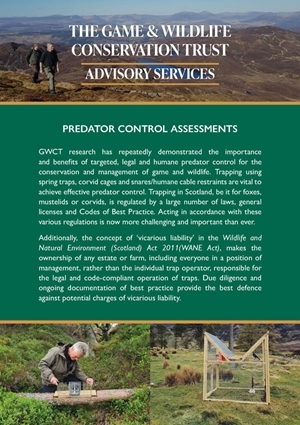 GWCT research has repeatedly demonstrated the importance and benefits of targeted, legal and humane predator control for the conservation and management of game and wildlife. Controlling predation using spring traps, corvid cages and snares/humane cable restraints are vital to achieve effective species recovery and to help arrest biodiversity loss. Trapping in Scotland, be it for foxes, mustelids or corvids, is regulated by a large number of laws, General Licenses and codes of best practice. Acting in accordance with these various regulations is now more challenging and important than ever.
GWCT research has repeatedly demonstrated the importance and benefits of targeted, legal and humane predator control for the conservation and management of game and wildlife. Controlling predation using spring traps, corvid cages and snares/humane cable restraints are vital to achieve effective species recovery and to help arrest biodiversity loss. Trapping in Scotland, be it for foxes, mustelids or corvids, is regulated by a large number of laws, General Licenses and codes of best practice. Acting in accordance with these various regulations is now more challenging and important than ever.
General Licences in Scotland are issued annually by NatureScot and can therefore be subject to revisions; however small these may appear in print, they can have worrying consequences in the field if not adhered to. The game sector throughout Scotland finds itself carefully scrutinising the minutia of the Wildlife Management & Muirburn Bill as it works its way through its staged political process. We can but hope that some common sense will prevail to reach a workable outcome. That said, the Minister has already announced her intention to ban all forms of snares, including humane cable restraints (HCRs), even under licence. It is a minefield, and keeping abreast with a myriad of change can prove challenging. Whilst GWCT, along with others such as SGA and BASC, will inform their members of any proposed changes that may affect management practices, it is worth highlighting some of the practical steps land managers and their staff can undertake to ensure they are operating in confidence and knowledge.
Printing off the relevant annual General Licences each year so that each trap operator can read them is one simple step. You do not need to possess one, but those practising corvid control need to be fully aware of the important conditions of use. This is crucial as, for example in Scotland, the permissible decoy species differ between Larsen traps and multi-catch crow cages. If you fall foul of General Licence conditions there is a real risk that the ability to operate under licence will be withdrawn, with disastrous consequences to jobs, effective wildlife management and biodiversity.
Compliance with law is an obvious must. Adopting best practice is crucial as not only can it improve the control of target species but, more importantly, it should help eliminate any poor welfare issues that may arise. The concept of ‘vicarious liability’ in the Wildlife and Natural Environment (Scotland) Act 2011 (WaNE Act) makes the ownership of any farm or estate, including everyone in a position of management, rather than just the individual trap operator, responsible for the legal and code-compliant operation of traps. Due diligence and ongoing documentation of best practice provide the best defence against potential charges of vicarious liability. In a world of increasing social media output, there are a lot more users of the countryside, equipped with only a little knowledge and very little understanding should they come across and question a legal predator control activity.
GWCT Scotland Advisory Services offer Predator Control Assessments as an effective, tailored documentation tool for farms or estates to ensure and demonstrate legal and best-practice trap operation. An outside, well-trained eye can make all the difference on how far the best practice bar can be raised. Regular annual or biannual site visits by one of our expert advisors help identify any possible shortfalls in legal aspects as well as ensuring the trap operator actions are fully humane and conform to current animal welfare legislation. Reports based on these inspections help equip estates or farms with the documentation required to display ongoing due diligence. In this way, Predator Control Assessments give you the peace of mind that comes from knowing that everything is above board. For further details see this page.
DOWNLOAD FLYER >
GWCT also offer excellent training opportunities on all aspects of modern and legal predator control. Our suite of refreshed, certified courses provide a thorough update for everyone involved with game and wildlife management on up-to-date legislation and what constitutes best practice, whilst also demonstrating on-going due diligence. To view all the courses arranged for the end of February and into March, see our calendar.
To arrange one of our highly regarded Predator Control Assessments or enrol on one or more of our specialist courses, please visit gwctadvisoryscotland.co.uk or contact us on 0131 202 7670 or email scottishadvisory@gwct.org.uk.